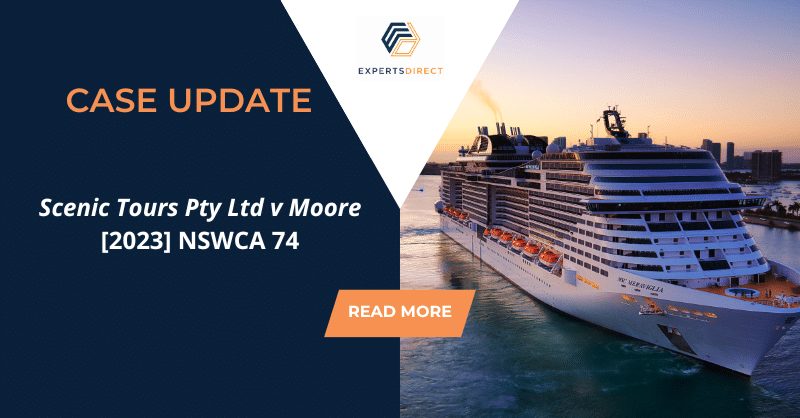Scenic Tours Pty Ltd v Moore [2023] NSWCA 74
In this case, an expert in the travel business was considered by the court to be problematic for not disclosing his relationship with the party who retained him, and for having had considerable assistance in the authorship of his report.
Background
In 2014, respondent David Moore commenced a representative proceeding on behalf of himself and approximately 1500 group members against the appellant, Scenic Tours Pty Ltd (Scenic), in relation to 13 European river cruises scheduled to depart between 19 May 2013 and 12 June 2013.
Mr Moore alleged that the cruises were substantially disrupted by the decisions and actions taken by Scenic when it was confronted with high water levels on the rivers owing to heavy rainfall and flooding which occurred in Europe from April through June 2013.
In a judgment dated 31 August 2017 (Moore v Scenic Tours Pty Limited (No 2) [2017] NSWSC 733), it was held that Scenic breached the consumer guarantees in ss 61(1) and 61(2) of the Australian Consumer Law (ACL) in respect of 10 of the 13 cruises. Damages comprising of compensation both for a reduction in the value of services (under s 267(3) of the ACL) and damages for distress and disappointment (under s 267(4) of the ACL) were awarded at first instance.
The Court of Appeal overturned the award of damages in part, but that decision was then overturned by the High Court (Moore v Scenic Tours Pty Ltd (2020) 268 CLR 326; [2020] HCA 17), which held the group members were entitled to damages for distress and disappointment pursuant to s 267(4) of the ACL. The Court reinstated the primary judge’s initial award of damages for distress and disappointment.
Expert evidence
Mr Moore called Ms B, a tourism management and marketing expert, to give expert evidence on the claim for reduction in value damages. Scenic called Mr H, who had decades of experience in operating a travel agency business, as an expert witness on this aspect of the damages claim.
Findings at first instance
Despite Mr H’s considerable experience, the primary judge considered him a “problematic expert” because:
- He did not advise the Court that when he had travelled on a river cruise with Scenic, he travelled for free as a guest for about one third of that cruise. His experience as with Scenic was not comparable to those of a consumer who had booked a holiday package, nor a passenger paying for an entire package.
- Mr H’s report did not identify that his business had an ongoing commercial relationship with Scenic through which he received commissions for sales of Scenic’s holiday packages by his travel agencies.
- It was revealed in cross-examination that Mr H received considerable assistance from a manager of one of his travel agencies in preparing his report. However, there was no evidence as to that manager’s qualifications, training, or experience in the travel industry. The joint authorship of the report did not give the Court much confidence in assessing which opinions expressed in it were Mr H’s.
- Mr H did not make detailed reference to the way in which he went about assessing the price at which each cruise in the circumstances which occurred could be priced for sale.
- Contrary to Ms B’s approach, Mr H treated each day of the cruise as being equally valuable, without taking into account where the ship was moored on any given day. [90]
Scenic’s arguments on appeal
On appeal, Scenic argued that the primary judge erred in preferring the evidence of Ms B over that of Mr H in respect of the six relevant cruises, based on the following grounds:
- Ms B was wrong not to make any allowance for changes in circumstances, or vicissitudes.
- Ms B did not take into account the fact that customers on a cruise had an option of “skipping” bus tours, and such omission meant that Ms B was not valuing what was actually provided by Scenic.
- Ms B assumed that consumers travelled to Europe for the sole purpose of taking a Scenic cruise as opposed to doing additional activities, and did not have regard to the correspondence Scenic had received from some consumers congratulating it for having handled the difficulties presented by the flooding.
The Court of Appeal rejected Scenic’s arguments and found:
- Scenic’s argument that Ms B was wrong not to make any allowance for vicissitudes lacked substance. Based on record, the market price for a cruise itself included vicissitudes, a proposition which had been accepted by Scenic’s counsel. [173]
- Ms B’s approach was correct in that it focused upon the market value of a cruise by reference to what a reasonable consumer fully informed would have paid for the cruise at the time of booking. [176]
- The argument that Ms B had assumed that consumers travelled to Europe for the sole purpose of cruising lacked foundation as Ms B had not made such an assumption. [177]
Key takeaways
- Experts should disclose information about any prior or existing relationships they may have with the party instructing them. Non-disclosure of such factors may affect the weight to be given to the evidence of the expert.
- Joint authorship of an expert report should be avoided. If an expert receives assistance from another person in the preparation of their report and this is not disclosed, it can undermine the court’s confidence which parts were written by the expert who is said to have written the report.
- This case serves as a reminder for experts of the importance of setting out your methodology and reasons for arriving at your conclusions in your report.
You can read the full decision here.
